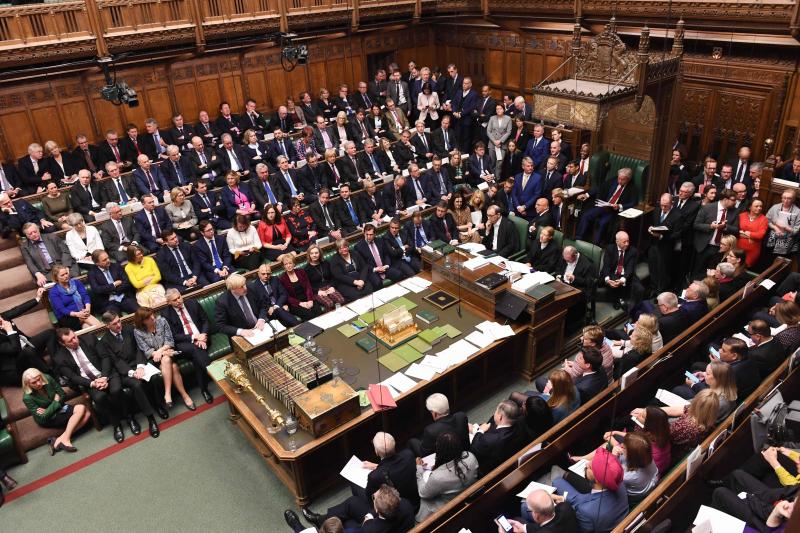Britain's Parliament avoids approving Boris Johnson's Brexit deal
Sign up now: Get ST's newsletters delivered to your inbox

Britain's Prime Minister Boris Johnson making a statement in the House of Commons in London on Oct 19, 2019.
PHOTO: AFP/UK PARLIAMENT
Follow topic:
LONDON - British Prime Minister Boris Johnson has suffered a serious blow after an emergency meeting of Parliament in London refused to approve the separation deal he negotiated with the European Union, and ordered him instead to seek a three-month extension for the negotiations with the EU.
Mr Johnson has vowed to try again to get the EU deal approved in parliamentary sessions next week. But the unprecedented political crisis in London is deepening, and the odds on an early general election to break the logjam are rising.
Mr Johnson, who came to office in July on a platform of unremitting hostility to the EU, surprised observers by negotiating a markedly flexible deal which offered the prospect of an amicable and friendly separation from the EU, in an effort to minimise the feared disruption to trade.
The deal also overcame the biggest obstacle to the talks with Europe: the status of the border across the island of Ireland, dividing Northern Ireland, which remains part of the United Kingdom, from the Republic of Ireland, which continues to be a member of the EU.
Armed with these concessions, Mr Johnson convened Parliament for an extraordinary session on Saturday (Oct 19). This in itself was exceptional, since the British Parliament has met only a handful of times on a Saturday, and only when the nation faces historic decisions of the utmost importance.
But the government felt justified in asking for the emergency debate since Britain's membership in the EU is supposed to lapse by the end of this month regardless of whether a separation treaty is concluded or not, so if a deal is to be put in place, not one day can be wasted.
During Saturday's heated parliamentary sessions, the British Prime Minister warned lawmakers to "abandon the delusion" that Britain's departure from the EU could be delayed again.
"If there is one feeling that unites the British public with a growing number of officials in Brussels, it is a burning desire to get Brexit done," Mr Johnson added, referring to the popular nickname given to Britain's process of separation from the EU.
Yet it soon became clear that Mr Johnson's wish to have the deal ratified quickly had no chance of being realised.
His ruling Conservatives do not enjoy an overall majority in the 650 seat-strong House of Commons, so they needed the support of opposition parties. And that proved elusive.
Labour, Britain's biggest opposition party, came out against the deal, largely because it is in Labour's interest to continue the current paralysis in the hope that this would discredit the government. Labour's preferred approach is that any arrangement with the EU should be put to another referendum.
"Voting for the deal won't deliver certainty, and the people should have the final say," Labour's leader Jeremy Corbyn said, straining to be heard during Saturday's noisy parliamentary debates.
Mr Johnson anticipated a rejection from opposition parties, yet still hoped that some individual opposition MPs could be enticed to vote with the government, if only to see the Brexit long-drawn saga concluded once and for all.
Instead, Conservative rebel MPs and opposition parties joined hands in voting by 322 to 306 to postpone approval of the deal until Mr Johnson specifies in a new and detailed law what the arrangements with the EU would mean in practice for the British people and economy.
Since that is bound to take time, the real purpose of this parliamentary tactic is to force Mr Johnson to seek a postponement of the date of Britain's departure from the EU, from the end of this month to the end of January.
A furious Mr Johnson vowed on Saturday night that he will not negotiate a delay with the EU and that "neither does the law compel me to do so".
He now intends to introduce legislation on Monday to implement the deal he negotiated with Europe, in the hope that he could still have it approved by the end of this month.
However, his refusal to consider asking the EU for an extension for the negotiations is certain to dominate British politics in the near future. For Parliament has already voted on a law which obliges the Prime Minister to seek a postponement if he failed to conclude a deal with the EU, and Mr Johnson's claim that he will not do so has already resulted in threats from lawmakers that they will drag him through the courts.
And as MPs continue to quibble, public clamour for another referendum on the whole question of leaving the EU is mounting.
Hundreds of thousands of demonstrators converged on London on Saturday, and their chants resonated loudly and clearly inside the parliamentary chamber.

